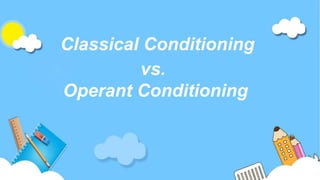
Classical conditioning vs operant conditioning (2)
- 2. Submitted To, Vidyalakshmi Ma’am KUTEC Chala Kasaragod Submitted By, Divya Nath KUTEC Chala Kasaragod
- 3. CONTENTS Classical Conditioning1 Conclusion4 Operant Conditioning2 Classical vs Operant Conditioning3
- 4. C l a s s i c a l C o n d i t i o n i n g PART1
- 5. Ivan Pavlov • Ivan Petrovich Pavlov - Russian Psychologist • Born - 26 September 1849 • Known primarily for his work in classical conditioning • Pavlov was awarded the Nobel Prize in Physiology • Died - 27 February 1936
- 6. Classical conditioning refers to a learning procedure in which a biologically potent stimulus is paired with a previously neutral stimulus. What is Classical Conditioning?
- 7. How Classical Conditioning Works There are three basic phases of this process. Phase 1: Before Conditioning Phase 2: During Conditioning Phase 3: After Conditioning
- 8. Phase 1: Before Conditioning In the before conditioning phase, an unconditioned stimulus is paired with an unconditioned response. A neutral stimulus is then introduced.
- 9. Phase 2: During Conditioning The during conditioning phase involves pairing a neutral stimulus with an unconditioned stimulus. Eventually, the neutral stimulus becomes the conditioned stimulus.
- 10. Phase 3: After Conditioning In the after conditioning phase, the conditioned stimulus alone triggers the conditioned response.
- 12. O p e r a n t Conditioning PART2
- 13. About B.F Skinner • Burrhus Frederic Skinner - American Psychologist • Born - March 20, 1904 • Best-known for his influence on behaviorism • Skinner was named the most influential psychologist of the twentieth-century • Died - August 18, 1990
- 14. What Is Operant Conditioning? Operant conditioning, sometimes referred to as instrumental conditioning, is a method of learning that employs rewards and punishments for behavior.
- 16. How Operant Conditioning Work? Skinner distinguished between two different types of behaviors 1. Respondent behaviors 2. Operant behaviors
- 17. Respondent behaviorsare those that occur automatically and reflexively, such as pulling your hand back from a hot stove or jerking your leg when the doctor taps on your knee. You don't have to learn these behaviors. They simply occur automatically and involuntarily. Operant behaviors, on the other hand, are those under our conscious control. Some may occur spontaneously and others purposely, but it is the consequences of these actions that then influence
- 18. Components of Operant Conditioning There are several key concepts in operant conditioning. 1. Reinforcement in Operant Conditioning 2. Punishment in Operant Conditioning
- 19. Reinforcement in Operant Conditioning Reinforcement is any event that strengthens or increases the behavior it follows. There are two kinds of reinforcers. In both of these cases of reinforcement, the behavior increases. Punishment in Operant Conditioning Punishment is the presentation of an adverse event or outcome that causes a decrease in the behavior it follows. There are two kinds of punishment. In both of these cases, the behavior
- 20. Two kinds of Reinforcers1. Positive reinforcers are favorable events or outcomes that are presented after the behavior. In positive reinforcement situations, a response or behavior is strengthened by the addition of praise or a direct reward. If you do a good job at work and your manager gives you a 2. Negative reinforcers involve the removal of an unfavorable events or outcomes after the display of a behavior. In these situations, a response is strengthened by the removal of something considered unpleasant. For example, if your child starts to scream in the middle of a restaurant, but stops once you hand them a treat, your action led to the removal of the unpleasant condition, negatively reinforcing your
- 21. Two kinds of Punishment Positive punishment, sometimes referred to as punishment by application, presents an unfavorable event or outcome in order to weaken the response it follows. Spanking for misbehavior is an example of punishment by application. Negative punishment, also known as punishment by removal, occurs when a favorable event or outcome is removed after a behavior occurs. Taking away a child's video game following misbehavior is an example of negative punishment.
- 22. Understanding the Consequences of the Behaviour
- 24. C l a s s i c a l v s . O p e r a n t C o n d i t i o n i n g PART3
- 29. C o n c l u s i o n PART4
- 30. Conclusion Both of these studies have shown classical conditioning and operant conditioning can be useful in both animals as well as humans as separate topics. However by recognizing that these two processes occur at the same time can also add to the understanding of human behaviour, such as conditioned fears. Through evaluation of Pavlov’s and Skinner’s experiment it is clear to see that although they each have various strengths and weaknesses they both play a vital role within the study of human behaviour, with valid and practical applications to better aid the understanding of the human race, however if they were considered as one element instead of two they may be even more effective.
- 31. THANK YOU